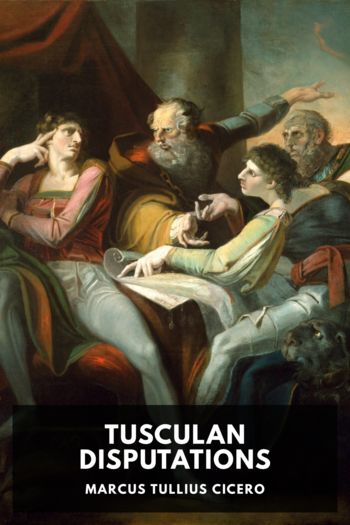Tusculan Disputations - Cicero (red novels TXT) 📗

- Author: Cicero
Book online «Tusculan Disputations - Cicero (red novels TXT) 📗». Author Cicero
Patroclus, to thy aid I must appeal
Ere worse ensue, my bleeding wounds to heal;
The sons of Aesculapius are employ’d,
No room for me, so many are annoy’d.
This is certainly Eurypylus himself. What an experienced man! While his friend is continually enlarging on his misfortunes, you may observe that he is so far from weeping that he even assigns a reason why he should bear his wounds with patience.
Who at his enemy a stroke directs,
His sword to light upon himself expects.
Patroclus, I suppose, will lead him off to his chamber to bind up his wounds, at least if he be a man. But not a word of that; he only inquires how the battle went:
Say how the Argives bear themselves in fight?
And yet no words can show the truth as well as those, your deeds and visible sufferings. Peace! and my wounds bind up. But though Eurypylus could bear these afflictions, Aesopus could not,
Where Hector’s fortune press’d our yielding troops;
and he explains the rest, though in pain, so unbounded is military glory in a brave man! Shall, then, a veteran soldier be able to behave in this manner, and shall a wise and learned man not be able? Surely the latter might be able to bear pain better, and in no small degree either. At present, however, I am confining myself to what is engendered by practice and discipline. I am not yet come to speak of reason and philosophy. You may often hear of old women living without victuals for three or four days; but take away a wrestler’s provisions but for one day, and he will implore the aid of Jupiter Olympius, the very God for whom he exercises himself: he will cry out that he cannot endure it. Great is the force of custom! Sportsmen will continue whole nights in the snow; they will bear being almost frozen upon the mountains. From practice boxers will not so much as utter a groan, however bruised by the cestus. But what do you think of those to whom a victory in the Olympic games seemed almost on a par with the ancient consulships of the Roman people? What wounds will the gladiators bear, who are either barbarians or the very dregs of mankind! How do they, who are trained to it, prefer being wounded to basely avoiding it! How often do they prove that they consider nothing but the giving satisfaction to their masters or to the people! for when covered with wounds, they send to their masters to learn their pleasure: if it is their will, they are ready to lie down and die. What gladiator, of even moderate reputation, ever gave a sigh? who ever turned pale? who ever disgraced himself either in the actual combat, or even when about to die? who that had been defeated ever drew in his neck to avoid the stroke of death? So great is the force of practice, deliberation, and custom! Shall this, then, be done by
A Samnite rascal, worthy of his trade;
and shall a man born to glory have so soft a part in his soul as not to be able to fortify it by reason and reflection? The sight of the gladiators’ combats is by some looked on as cruel and inhuman, and I do not know, as it is at present managed, but it may be so; but when the guilty fought, we might receive by our ears perhaps (but certainly by our eyes we could not) better training to harden us against pain and death.
I have now said enough about the effects of exercise, custom, and careful meditation. Proceed we now to consider the force of reason, unless you have something to reply to what has been said.
A.That I should interrupt you! By no means, for your discourse has brought me over to your opinion.
M.Let the Stoics, then, think it their business to determine whether pain be an evil or not, while they endeavor to show by some strained and trifling conclusions, which are nothing to the purpose, that pain is no evil. My opinion is that whatever it is, it is not so great as it appears, and I say that men are influenced to a great extent by some false representations and appearance of it, and that all which is really felt is capable of being endured. Where shall I begin, then? Shall I superficially go over what I said before, that my discourse may have a greater scope?
This, then, is agreed upon by all, and not only by learned men but also by the unlearned: that it becomes the brave and magnanimous—those that have patience and a spirit above this world—not to give way





Comments (0)